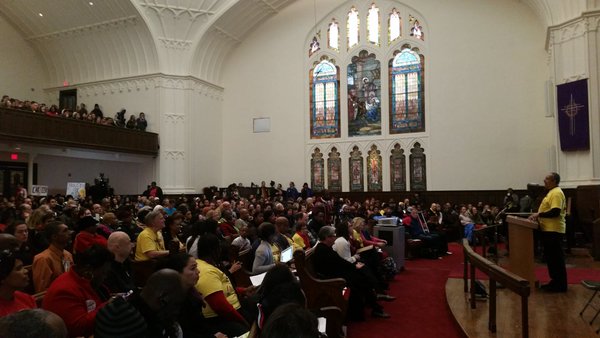It's not much, but it's home -- encampment near Union Station on 1st St NE about to be taken down by DC govt pic.twitter.com/aNf87GUn7l
— Neal Augenstein (@AugensteinWTOP) March 10, 2016
Sign posted on 1st St NE warns of impending cleanup of homeless encampment pic.twitter.com/tNR5Nl15CE
— Neal Augenstein (@AugensteinWTOP) March 10, 2016
Leighland's belongings are packed -- he's not sure where he's headed next as encampment is removed. pic.twitter.com/79ajn1WjAX
— Neal Augenstein (@AugensteinWTOP) March 10, 2016
Sleeping bags, tents, cardboard boxes loaded in trash truck, as homeless encampment is removed. pic.twitter.com/95zv4CqCcZ
— Neal Augenstein (@AugensteinWTOP) March 10, 2016
Items that were on the sidewalk with nobody nearby were trashed. pic.twitter.com/3H85MYuwTV
— Neal Augenstein (@AugensteinWTOP) March 10, 2016
Private social services providers document, and help pack up tents, as homeless encampment is taken down. pic.twitter.com/8tfzOZ0kn4
— Neal Augenstein (@AugensteinWTOP) March 10, 2016
Some pack belongings into large plastic bags, as homeless encampment is removed, under bridge on 1st St NE pic.twitter.com/JQkCNbqvpT
— Neal Augenstein (@AugensteinWTOP) March 10, 2016
As homeless encampment is taken down, residents ready their belongings for whatever comes next. pic.twitter.com/ZUkjfpxDo7
— Neal Augenstein (@AugensteinWTOP) March 10, 2016
Almost packed, unclear what's next for this woman, as she readies to leave homeless encampment. pic.twitter.com/KdS3u3MUaR
— Neal Augenstein (@AugensteinWTOP) March 10, 2016
Property of homeless people living under a bridge on 1st St NE are loaded into a truck, to be stored. pic.twitter.com/SkkNc9NbkF
— Neal Augenstein (@AugensteinWTOP) March 10, 2016
Items packed, labeled by residents of homeless encampment will be stored for 30 days by DC govt. pic.twitter.com/KIHJGl71qH
— Neal Augenstein (@AugensteinWTOP) March 10, 2016
Gone. The temporary home for two dozen homeless is just 1st St NE again. What will become of those who lived here? pic.twitter.com/GCrq0eNIfj
— Neal Augenstein (@AugensteinWTOP) March 10, 2016
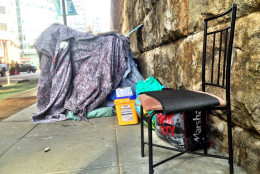

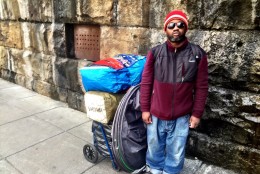
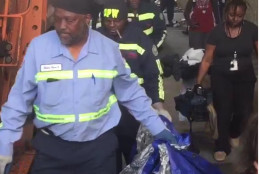

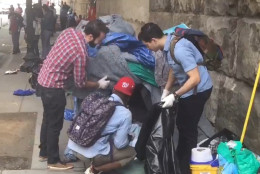



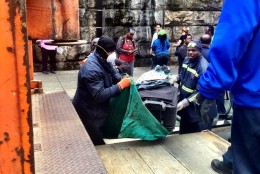
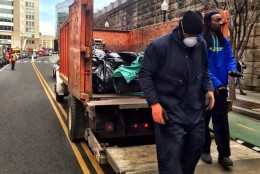

WASHINGTON — It wasn’t much, but it was home. At least temporarily.
About two dozen homeless people who had been living under a bridge alongside Union Station for several weeks, were forced to pack up and leave Thursday morning by D.C. government.
The camp of tents, sleeping bags and cardboard boxes lining sidewalks on both sides of First Street Northeast, was in full view of those walking to Union Station, the CNN complex and businesses in the surrounding rejuvenated neighborhood.
Employees from D.C. government stood by as those living there packed their belongings into large black plastic bags.
The residents were given weeks of warning, according to a notice posted at the camp. Under the mandate of the Office of the Deputy Mayor of Health and Human Services, Thursday at 10 a.m. was specified as the time the encampment would be cleaned up.
Leighland Nelson, who has lived under the bridge for several weeks, has felt safe there. “It’s OK, as long as I’m close to the rest of the people. I don’t think anyone’s gonna bother us,” he says from behind dark sunglasses. “But when I’m by myself, I feel unsafe, very unsafe.”
Homeless advocate Eric Sheptock wanted to make sure those being displaced still had access to their belongings, shelter, health and mental health care.
“Not just told that they have to go, and that their stuff isn’t just thrown away,” said Sheptock.
While D.C. agencies have offered shelter, food, and other services to the homeless, many refused the help, said Jennifer Valdivieso with the D.C. Office of the Deputy Mayor for Health and Human Services in an email to Sheptock. “The services the District offers are voluntary and residents are within their legal right to deny services.”
With the help of private social services advocates, many living in the encampment packed up items they wanted to store, while they contemplate their next living arrangement.
The D.C. Office of the Deputy Mayor for Health and Human Services said items that were packaged would be stored for at least 30 days, and that their owners would be able to retrieve them.
Nelson, who says he’s been homeless for 10 years after completing high school and trade apprenticeships, had neatly packaged his belongings in a grocery cart, covered in plastic and labeled with a marker on pieces of masking tape.
He hopes he’ll be able to find transitional housing again, relishing thoughts of a more stable lifestyle.
“I had my shoes lined up, the floor would be clean. After I’d sweep the floor I’d put some Mop-n-Glow on it. My room was neat, it was clean,” he recalled.


